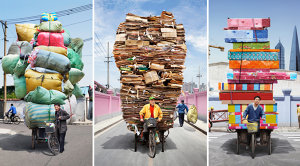We thought it was a hoax.
I was in the newsroom a little after 3 p.m. on April 15 when Jack, a fellow reporter, said he just read on Twitter that there were two blasts at the Boston Marathon. We had shut the TV off after the early runners crossed the finish line and Jack switched it back on to disprove the rumor. You know how that went.
We spent the next few hours getting details to put on our website and Twitter. Our city editor said that
The New York Post was reporting 12 people had died, but then added "but it's
The New York Post" and we did not put those numbers online. We had a sports reporter who was at the event but had left before the explosions.
About an hour after the blast, when we were still calling them "explosions" and not "bombs," our editor asked for a reporter and a photographer to drive 50 miles to Boston to check it out. Jack was all over it and spent the rest of the day trying to get something, but it was all chaos. No one really knew what was going on and we had trouble getting any substance.
I finished writing the small potatoes stories I had reported on earlier in the day and on my way home I stopped by the commuter train station to talk to people coming from Boston. The local police had stationed a motorcycle officer there to watch people disembark. Most people didn't want to talk but I was able to speak to a father and son who made a day trip to watch the Red Sox. They were held up several hours getting back because the subway was shut down and they had to walk six miles to the train station where they were wanded and frisked.
The next day I got called in early to write about how the bombing would impact events in smaller communities. When a big story like this happens in our backyard we will have primary stories talking about the event supplemented with tons of lesser stories on different angles. We all wrote several of them. By the time Saturday rolled around and one suspect was captured and the other was dead I was talking to local state lawmakers, all of them democrats, about why they support the death penalty in this case.
The political implications of this case is overwhelming. On the night of the bombing
a piece was being passed around from the Daily Kos about Carlos Arredondo, one of numerous civilians who helped save people by picking them up and rushing them to medical staff. In his case, he had the foresight to stop blood loss in a victim and tore down several barriers to help other people get to the victims.
Arredondo became a media darling and received more attention than anyone else who helped saved people. I suspect it wasn't just because of heroic actions and the famous photograph he appeared in, but also his status as an illegal immigrant from Costa Rica, war protester and father of a soldier killed in Iraq. People who support immigration amnesty jumped all over this case because it showed the value to our society immigrants can bring.
As the story unfolded we learned Arredondo wasn't the only immigrant that played a major role. Lu Lingzi, a Chinese grad student who studied statistics at Boston University, was one of three people killed by the bombs.
Then it turned out that the bombers,
Dzhokhar and Tamerlan Tsarnaev, were Chechnyan immigrants.
So what lesson does this teach us about immigration? I say, nothing. Immigrants are just people. It's a bit embarrassing for people who wanted to trumpet Arredondo's heroism when it turns out the bombs came from immigrants too. It's also awkward for the anti-immigration people who want to stress the evil caused by the Tsarnaev brothers, both legal immigrants, when they are counting an immigrant as one of the victims and an illegal immigrant was clearly a savior.
Immigration needs to be debated on its own merits, and rare but horrible events like the one in Boston last week contribute little more than anecdotes. I've been in favor of open borders for a long time, although I support keeping tabs on who comes in to give us the chance to filter out known criminals. I dislike seeing anti-immigration folks capitalize on this tragedy. But by the same hand, is it any better for us pro-immigration supporters to capitalize on it in the same way? I don't see much of a difference.
Read more...

